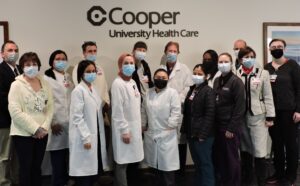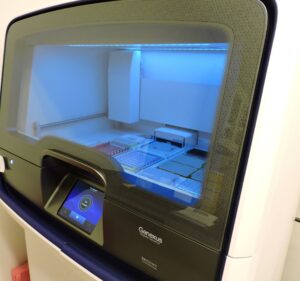
The Center for Special Diagnostics team, part of the Department of Pathology at Cooper University Health Care
The Department of Pathology at Cooper University Health Care has added the Genexus Integrated Sequencer, a new, fully automated, next-generation rapid gene sequencing technology to its diagnostic resources. Gene sequencing allows physicians and scientists to identify and understand the genetic profiles of many viruses, tumors, and other specimens.
Cooper is one of a very few health systems in New Jersey that is able to perform next generation gene sequencing on site. The new technology will enable Cooper to identify COVID-19 variants for those patients tested that will provide valuable information about the spread of the virus and how it is changing.
“Next-generation gene sequencing technology is at the forefront of precision medicine. We are a leading academic health system in the region, and this technology is a great addition to our laboratory and will help expand our capabilities,” said Roland Schwarting, MD, chairman of the Department of Pathology and Laboratory Medicine.
As one of three health systems appointed in 2020 to help manage New Jersey’s COVID-19 response, Cooper received a grant to support testing, community outreach, treatment, and mitigation efforts related to the pandemic. The granted-funded gene sequencing equipment is currently being used to determine a patient’s exact variant of SARS-CoV-2, the virus that causes COVID-19.
“This new technology is our latest weapon in our battle against COVID-19 and will allow Cooper to advance statewide efforts to understand which variants are most prevalent, as we work to mitigate the spread of this virus,” said Kevin O’Dowd, JD, co-CEO of Cooper.

The Genexus Integrated Sequencer, a new, fully automated, next-generation rapid gene sequencing technology at Cooper University Health Care.
Every week, hospitals throughout the state send randomly selected swabs from COVID patients to the New Jersey Department of Health for sequencing in order to help the NJ health officials determine the prevalence of the different variants. By sequencing the specimens in-house using the new rapid technology, Cooper will produce results of SARS-CoV-2 variant testing within a few days providing the NJ Department of Health with valuable information to contribute to the statewide effort to control COVID-19 infection.
“This information might influence treatment decisions, and can also help us investigate how the virus has spread between different people,” said Raquel Nahra, MD, an infectious disease specialist and epidemiologist at Cooper.
Having this new technology onsite rather than outsourcing it will enable research collaborations between the department of pathology and clinical departments, as well as Cooper Medical School at Rowan University.
“The research that our clinical experts will be able to do with this new technology will not only benefit our fight against COVID-19, but allow us to develop new treatments for patients affected by many other conditions,” said Anthony J. Mazzarelli, MD, JD, MBE, co-CEO of Cooper.
